
Tipping around the world
Every successful traveler needs two things: a smile and respect for the culture of the country they’re visiting, says Lori Whatley, PhD, a human behavior expert and clinical psychologist who has coached thousands of clients on proper behavior, both domestic and international. A smile is easy. Respect, on the other hand, requires you to care enough to study customs involving things like personal space, attire, and tipping around the world.
“Respect is paramount when you travel, and a polite traveler respects both the people and the etiquette of wherever they are,” she says. “Just as it’s important to pack enough socks and underwear, it’s important to read up on common courtesies beforehand, as what is considered polite in one culture may be insulting or confusing in another.”
One way to show respect includes knowing when, where, and how to tip, says Bonnie Tsai, international protocol expert and founder and director of Beyond Etiquette. Of course, that’s easier said than done. Just knowing how much to tip in the United States can be confusing, and the rules vary widely from country to country. (Take, for instance, how much to tip hotel housekeeping. In Mexico, you’d leave 20 to 100 pesos—or $1 to $5 U.S.—per day, but in Scandinavia, you wouldn’t tip hotel staff at all.) If you’re unsure of the tipping etiquette, don’t fret. We’ve got you covered with this cheat sheet for tipping around the world.

General rules for tipping around the world
No matter where your travels take you, there are some general tipping rules Whatley recommends:
- Leave tips in cash in the local currency.
- Check your bill first to see if a gratuity or tip has already been added.
- Hand money to people, when possible, rather than leaving it on a table or going through a third party.
- If you’re unsure about tipping norms, ask the concierge at the hotel or the owner of the hostel, Airbnb, or home where you’re staying.
- Check in at local tourist information places. They may have a brochure or guide for tipping in the area.
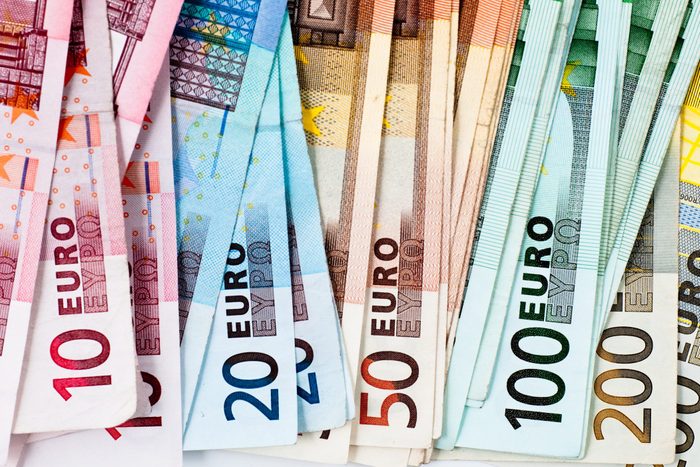
Tipping in Europe
Tipping culture in Europe is more relaxed than in the United States, so there’s a lot less pressure to know all the rules, according to Maryanne Parker, an international etiquette expert and founder of Manor of Manners International. Whether you’re tipping in Spain, tipping in France, or tipping in one of the other 44 European countries, it’s seen as nice but not always necessary. And in many situations, it’s already built into the price. Tips, when given, are usually a smaller percentage, in the 10 to 15 percent range.
When calculating tips, keep in mind that European service staff—and restaurant workers, in particular—may be less solicitous than people in the West are used to, says Tsai. Rather than checking in on you repeatedly, they often wait for you to signal that you need something. This is particularly true in Italy, she adds. It’s something to keep in mind when considering your own dining etiquette—don’t get belligerent just because service isn’t the same as at home.
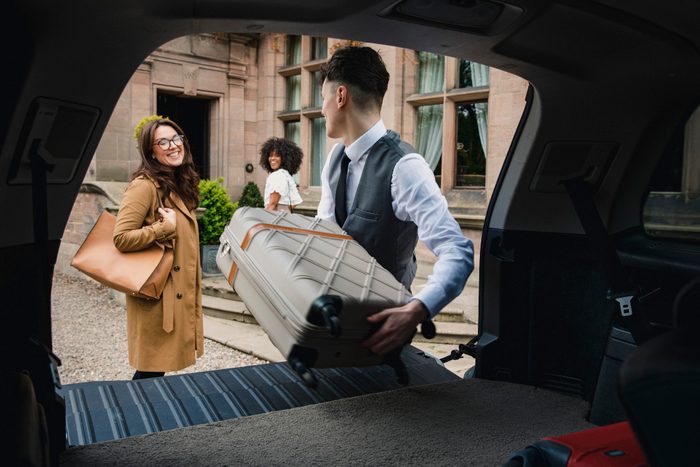
Tipping at European hotels
Tipping varies by country, size of city, and type of lodging, but it is usually a courtesy to offer a small tip to a porter who carries your luggage—think $1 per bag in the local currency. Similarly, feel free to leave $1 to $2 per day, in the local currency, for the housekeeping staff.
If you’re staying in a hostel, tips are generally not expected, but you can offer a small cash tip if someone goes above and beyond in helping you out, like safeguarding valuables or making reservations for you.
Federal laws in Switzerland mandate that all service charges be included in published prices, meaning you don’t need to tip any people in the service industry, including hotel staff. That said, they won’t turn down a tip to housekeeping given at the end of your stay.
Russia and some Eastern European countries are the exceptions. In these places, hotel staff is often underpaid, and they depend on higher tips. Plan to tip 10 to 15 percent of the bill.

Tipping at European restaurants
Here in the States, servers expect guests to tip about 15 to 20 percent of the bill for good service. But restaurant tips are generally smaller in Europe, usually ranging from 5 to 10 percent of the bill. It’s very common for tips to already be included in the bill, so check before leaving extra money—overtipping is seen as a Yankee idiosyncrasy at best and rude at worst. Even countries (including those in Northern and Eastern Europe) that don’t have a “tip” or “gratuity” line on the bill usually have it included in the food prices.
If you choose to leave a small additional tip, hand it to your server in cash; don’t leave it on the tabletop. If you’re in Germany, make it a round number and give it to your server in bills, not coins.
The same Swiss rules for tipping at hotels also apply to restaurants. In other words, there’s no need to tip extra. Similarly, servers in Belgium and Denmark don’t expect tips, but most staff won’t decline a small gratuity if offered. Iceland is the big exception to that rule. It has a firm no-tipping culture, and restaurant staff are well paid. In fact, you likely won’t even see a line for a tip on the credit card bill.
While you’re considering the etiquette for tipping around the world, check out these rude restaurant mistakes you need to quit ASAP.

Tipping European tour guides
If you’re traveling with a tour company, it’s customary to offer a tip of 10 to 20 percent to the tour organizer at the end of your trip. But if you’re doing a day trip or meeting a private guide for a tour, tip $2 to $5 per person (or 10 to 20 percent for a group) at the end of the tour.
One thing to keep in mind: You’re expected to pay and tip tour guides and drivers separately. That said, speeches by impromptu tour guides, often standing outside popular tourist sites, don’t require tips. They’ll often solicit money at the end, and if you appreciated the information, give a dollar or two. (Psst! When you’re back home, you’ll be pretty pleased to know how much to tip your hairdresser the next time you go in for a trim.)
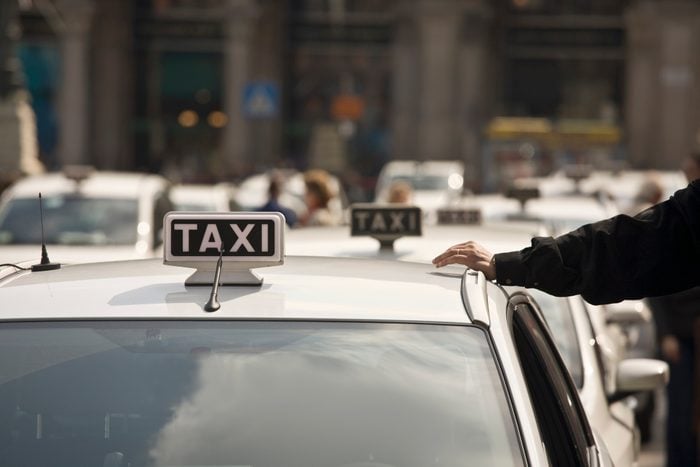
Tipping European taxi drivers
How much you tip a taxi driver in Europe depends on what exactly they do for you. Instead of a formal tip, simply round up the fare. For a short trip, round up to the nearest Euro or local currency. For longer trips, round up the fare to the nearest ten—for instance, for an €82 fare, give €90. It’s not an etiquette mistake to skip a larger tip, but it’s nice to add a few more dollars if the driver goes out of the way to help you, such as by carrying bags or giving you extra help at the airport.
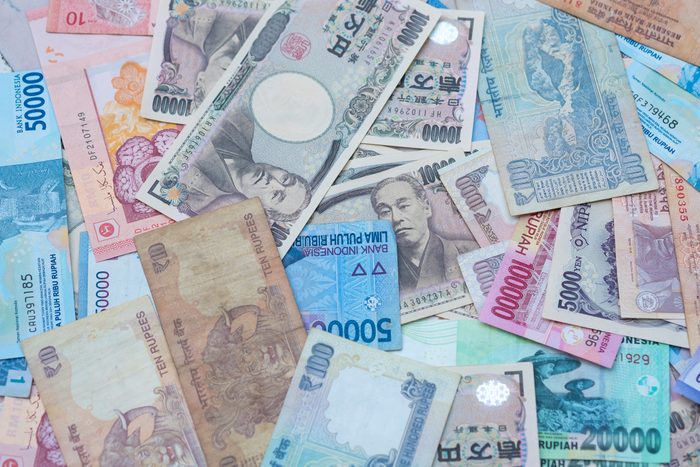
Tipping in Asia
There are 48 countries in Asia, and their views on tips vary widely. Chinese tipping culture isn’t the same as tipping in Japan, which is totally different from tipping in Thailand. The best rule of thumb is to look up the guide for the specific Asian country you’re traveling to. One thing to keep in mind is that “respect” is a basic principle of social interactions in most Asian cultures, and one way to show that is by knowing the tipping culture, says Tsai.
In general, India, Indonesia, the Philippines, and Thailand have adopted Western standards of tipping, so expectations for tips will be similar to the United States, although the amount is usually lower. But in China, Mongolia, Laos, and Taiwan, tipping is not expected. And in South Korea, Nepal, and Japan, tipping may be taken as an offense, as they consider their standards to be high and their service workers well paid. (If you really want to give a service worker a tip for exceptional service, consider putting it in a nice envelope and offering it as a “gift” at the end of your stay.)
The process for giving a tip will vary by country as well. For instance, instead of shaking hands, people in Thailand greet one another by putting their palms together at chest level—a greeting called a “wai,” says Whatley. So don’t try to slip a worker a tip through a handshake, as it’s seen as disrespectful, she adds.
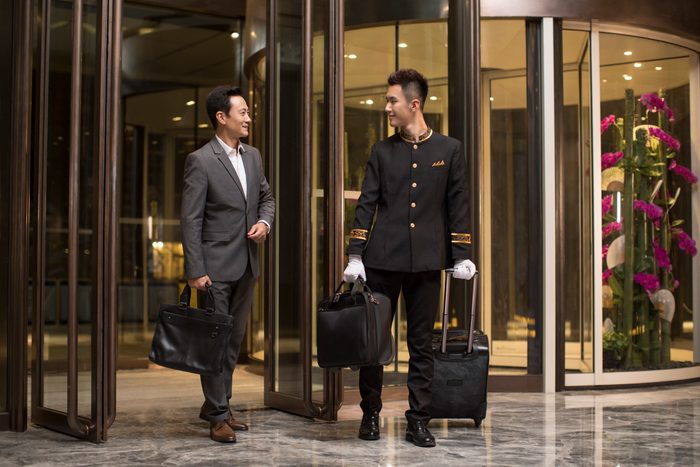
Tipping at Asian hotels
In most Asian countries, the nicer the hotel, the more likely you will be expected to tip. Even still, tips are generally just for porters and sometimes housekeepers, and they’re relatively small. At luxury hotels, expect to tip several dollars to the porter and $2 to $5, in the local currency, per day for housekeeping.
In pricier Hong Kong and Indonesia, it’s common to have a service charge included in the bill, so check before leaving extra. Chinese culture prides itself on not expecting tips, and service workers won’t ask for them. Still, they usually won’t turn them down if offered. The exception is Japan, where tipping is seen as gauche, and you may even have it handed back to you.
As you prep for travel, study up on these hand gestures that are rude in other countries. Avoiding them can save you some awkward (or angry) moments!

Tipping at Asian restaurants
If a tip is expected in an Asian restaurant, it’ll most likely be added to the bill before you receive it. Beyond that, no tip is expected. Hong Kong, Indonesia, Thailand, Malaysia, and the Philippines all usually include gratuity in the bill. Regardless of whether or not a tip is added to the bill, it’s still considered kind to round the bill up to the next number when paying.
There’s a split tipping culture in Singapore: Locals don’t tip, but tourists and foreigners are not only expected to tip but to tip well, usually 15 to 20 percent of the total bill. This is becoming more common in international hot spots. So if you’re vacationing in one of these areas, be sure to avoid the rude restaurant habit of skipping a tip because you’re in a foreign land.
In South Korea, small tips—5 percent or a few dollars—are expected in Western-style restaurants, but you don’t need to tip in Korean restaurants.

Tipping Asian tour guides
As they spend most of their time with tourists, tour guides and drivers in Asia are accustomed to being tipped. Most tour guides won’t ask for a tip outright but will take it if offered. Depending on the length of the tour, offer a few dollars per person, or 10 to 15 percent of the total charge. Give the tip in cash at the end of the tour. Expect to tip tour guides and drivers separately.
Tours are the one exception to Japan’s no-tipping policy, and most guides will accept a small gratuity if you offer it to them.
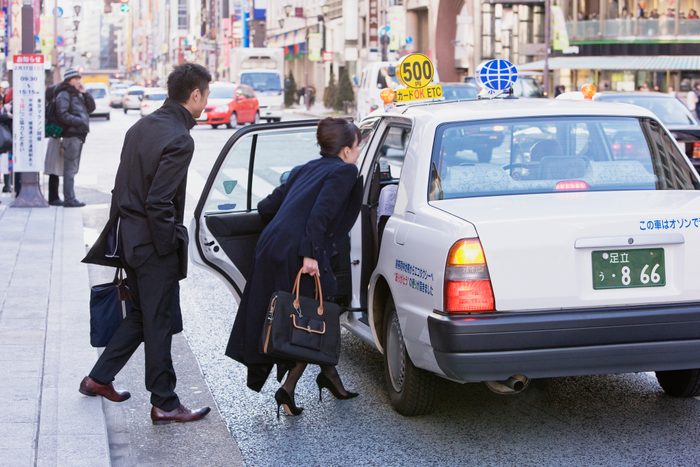
Tipping Asian taxi drivers
Instead of a formal tip, offer to round up the fare. For a short trip, round up to the nearest dollar or the equivalent currency. For longer trips, round up the fare to the nearest five or ten. How much you tip a taxi driver in Asia depends on what they do for you. Did the driver go above and beyond, helping you carry your bags or giving you extra assistance at the airport? Add a few more dollars to the total charge.
In Hong Kong, Thailand, Singapore, and the Philippines (some of the most beautiful countries in the world), drivers will often round up the fare themselves automatically. If they show you the meter instead, go ahead and round it up yourself.
That’s not the case for Japanese or Chinese drivers. They generally don’t expect or accept tips and will give you back exact change if you round it up.
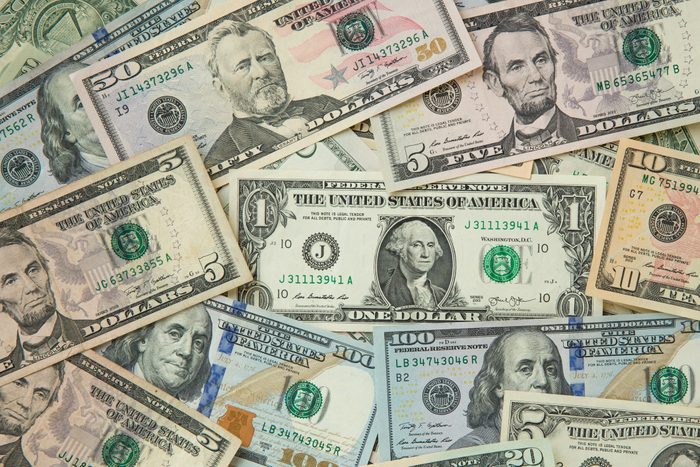
Tipping in the Americas
The U.S. and Canada have similar tipping policies and are known for generous gratuities in not just restaurants, travel, and hotels but also a wide variety of other services. Tipping in Mexico is similar to the United States, so you’ll want to tip 10 to 15 percent at restaurants, hotels, and resorts.
But things can change significantly once you head down through Central and South America. Tipping isn’t considered a hard rule, although it is appreciated. When you tip, the norm is around 10 percent of the bill.
Service workers in most countries prefer being tipped in the national currency, but that’s not the case in Peru. There, workers prefer American dollars. Mexicans accept tips in both dollars and pesos.
One thing to keep in mind when evaluating service is that things often move at a much slower pace in Central and South American cultures, and politeness and patience is valued over speed, says Tsai.

Tipping at hotels in the Americas
In the United States and Canada, tip porters $2 per bag and housekeeping $3 to $5 per day. In addition, tip the concierge if you got special help, and tip for room service. (Also worth keeping in mind in the United States? How much to tip at a nail salon and for pizza delivery.)
In Central and South America, the more luxe your lodging, the more tips will be expected. For instance, at a luxury resort in Mexico, you can expect to tip porters, valets, housekeeping, food service staff, and event coordinators, among other employees. Tip 15 to 20 percent, or $1 to $3 to a porter or valet. In less-fancy settings, tip porters $1 per bag and housekeeping $1 to $2 per day.
Something else to consider in Central and South America: In some countries, including Mexico, Colombia, Bolivia, and parts of Brazil, people will offer to watch your car while it’s parked to keep it safe. Be prepared to pay a fee and a tip, in cash.

Tipping at restaurants in the Americas
A tip of 15 to 20 percent (or more) is expected at most restaurants in the United States and Canada. Tipping is also expected at bars and coffee houses, and it’s common to see tip jars on the counters at other types of food establishments, like ice cream shops.
If you’re dining out in Argentina, Brazil, Colombia, Peru, Bolivia, Paraguay, Uruguay, or Chile, tip 10 percent of the bill if the service is good. If you’re in a high-tourist area, bump up the tip to 15 percent.
Check the bill first, especially in Mexico, Nicaragua, and Argentina, as restaurants often add gratuity automatically. If a tip isn’t included, you’re still expected to leave one—even if you don’t see a tip line on the bill. Hand it in cash directly to your server rather than leaving it on the table.
Suriname and French Guiana are the exceptions to the rule; waitstaff do not expect tips.

Tipping tour guides in the Americas
Tips for tour guides in North America can vary from place to place, but in general, tip $10 to $25 per person, per day. You may be expected to tip more at popular tourist attractions.
Tour guides in South America generally make the bulk of their money from tips, so it’s good to tip generously. Plan on giving $10 to $20 per person, per day, for a day tour. Add on $5 to $10 for the tour bus driver. If your group is large, includes small children, or has special needs (like dietary concerns), consider adding a few more dollars per person. Brazilian culture dictates that tour guides should be tipped more generously, usually $20 to $45 per person, per day.
If you’re doing a guided multi-day hike, like a trek through the Andes, tipping is handled differently. Talk to the tour company about what is expected and how to tip. And if you really want to make sure a tour company knows just how much you enjoyed the trip, consider writing a thank-you note on an online review site so other tourists know the guides are great.

Tipping taxi drivers in the Americas
At the end of your taxi ride in the United States and Canada, tip your driver an extra 10 to 15 percent on top of the fare.
It’s common in Central and South America to negotiate the price of a cab ride in advance—say, $30 to go to the airport. You may even be asked to pay up front. In that case, don’t worry about adding on an extra tip. That said, if the driver uses a meter, round up to the next whole dollar amount as a tip.
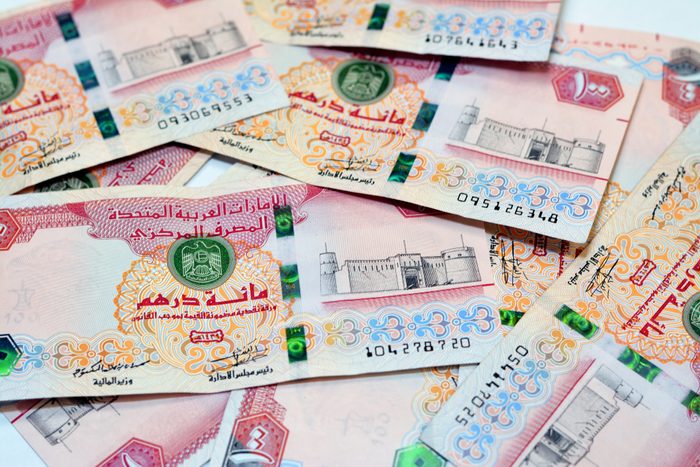
Tipping in the Middle East
Whether you’re headed to one of the most popular travel destinations in the Middle East or going off the beaten path, tipping is important. As in the West, tips are expected and appreciated in most of the Middle East, including the United Arab Emirates (UAE), Saudi Arabia, Qatar, Jordan, and Israel. In fact, federal law in Dubai mandates a 10 percent tip be automatically added to every service bill. Kuwait has the highest tipping standards, on par with the United States. Tipping in Iran and Iraq isn’t expected, but service workers will accept payment if offered.
Overall, Middle Eastern countries adhere to cultural rules more strictly than Westerners may be used to, says Parker. To show respect (and make sure your trip goes smoothly), it’s important to be aware of tipping protocols, she adds. If you aren’t sure what the rules are for a specific country, research what’s expected—don’t try to wing it.
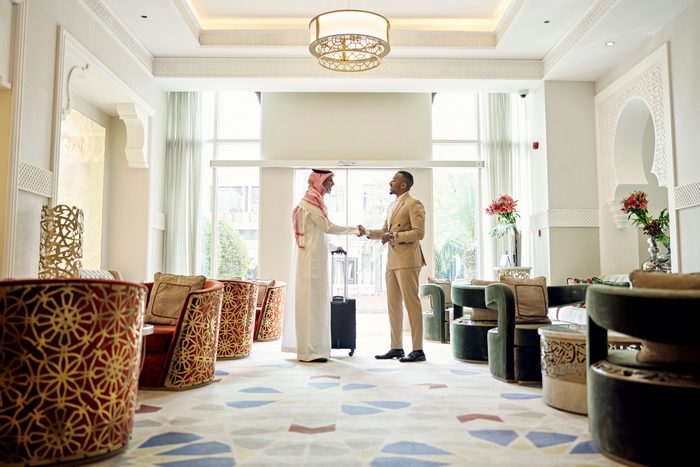
Tipping at Middle Eastern hotels
Tips similar to what you would pay in the West are expected in hotels in popular tourist locales, such as those in Israel and Jordan. Tip porters $1 to $2 per bag, and housekeeping $2 to $3 per day, in the local currency. It’s also considered good form to tip hotel concierges who go out of their way for you, such as getting you reservations at a popular restaurant or tickets to a show.
The tips are built into the bill in Dubai, and there’s no need to tip extra. In other locations, including the UAE and Saudi Arabia, tip porters and housekeeping staff around $1 per bag and $1 to $2 per day.
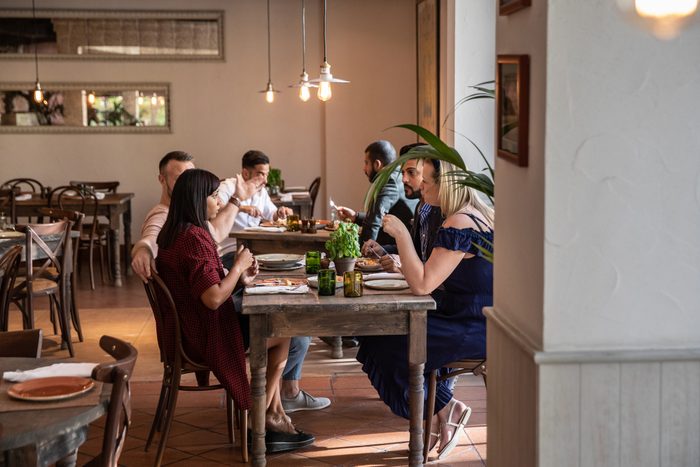
Tipping at Middle Eastern restaurants
Tipping 10 to 15 percent of the bill is standard practice in the UAE, Saudi Arabia, Qatar, and Jordan. Diners in Kuwait should tip a bit more, around 15 to 20 percent of the bill. You may or may not see a line for tips on the final bill or the credit card receipt, but you should tip regardless.
Check the bill in Israel and Jordan before tipping; it’s common for the gratuity to already be included in the bill. Diners in Dubai should expect a 10 percent tip included in the bill, but feel free to offer a few extra dollars for exceptional service.
When tipping in the Middle East, be sure to give cash to your server with your right hand. It’s rude to exchange money with the left hand in this area of the world.
In Muslim countries, be aware of when Ramadan—the holy month of Islam—falls, adds Parker. Because faithful Muslims will be fasting during the daytime, restaurants may have altered schedules or menus, and it’s appropriate to tip a bit more in the spirit of the holiday.

Tipping Middle Eastern tour guides
Tour guides aren’t just nice. They’re sometimes necessary for getting into tourist attractions in the Middle East. They also will ensure that you are aware of a location’s rules and customs, including dress codes and gender norms, adds Tsai. So you should expect to tip a bit more for the service—think $20 to $30 per person, per day, for day tours. If you have a private driver, tip $10 to $15 per person. Use the local currency, in cash.
Israel and Jordan are the exceptions. There, tour guides expect slightly larger tips—$25 to $35—and you should tip the driver at least as much as you do the guide.
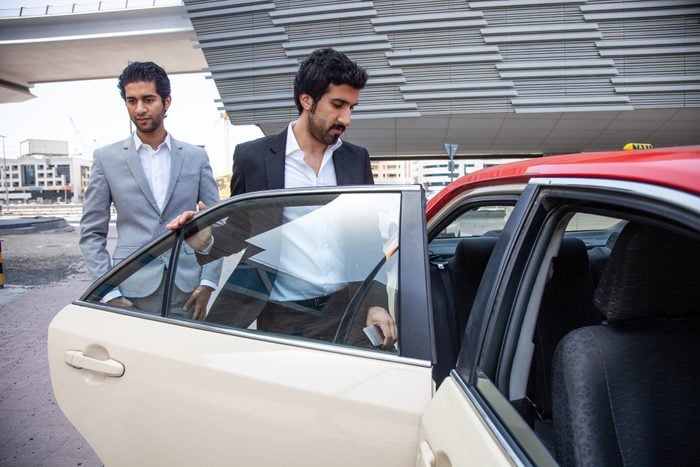
Tipping Middle Eastern taxi drivers
Etiquette rules for taxi rides in the Middle East are fairly easy to remember: Drivers appreciate a 10 to 15 percent tip on top of the fare, but for short rides, rounding up to the next dollar is usually enough. Drivers in Dubai don’t expect tips, but consider rounding up there as well.
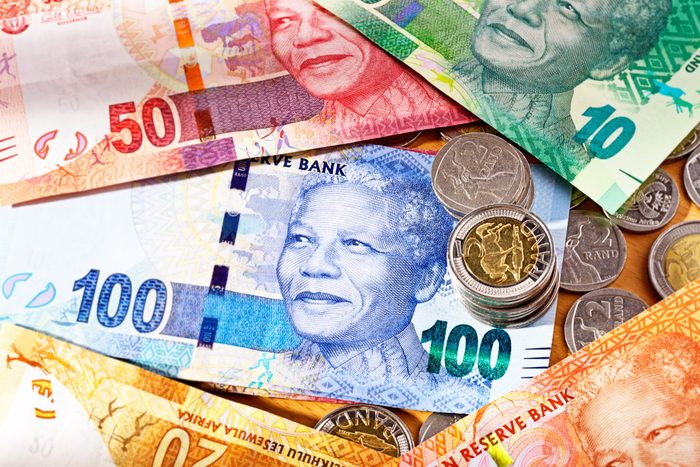
Tipping in Africa
There are 54 countries in Africa, and each one has its own distinct culture, complete with tipping rules, says Parker. Tipping is common and expected—but not obligatory—in nearly every African country. Generally, expect to pay 10 to 15 percent, except in Nigeria, Sudan, South Sudan, Tanzania, and Ghana, where tips average 10 percent or less.
Note that there are many places in Africa that don’t accept credit cards, so be prepared to change your cash to the local currency on arrival.

Tipping at African hotels
Hotel concierges, particularly in Egypt, South Africa, and Morocco, can make or break your trip. They often know everyone and everything, and they can connect you with whatever you need. Tip them $20 or more at the beginning of your trip to ensure good service, then follow up with an additional tip at the end of your trip. Tip hotel staff a smaller amount: $1 per bag to porters, and $1 to $2 per day to housekeeping.
Speaking of hotel stays, check out what travel agents consider the cleanest hotels for your next vacation.

Tipping at African restaurants
Dining establishments in South Africa, Egypt, and Morocco will often add a 10 percent tip to the bill, particularly in popular tourist spots. Check your bill before adding a tip, but feel free to leave an additional 5 percent for good service.
In other countries, the general rule is to tip 10 to 15 percent in the local currency. Be sure to hand the money directly to the server.
In many places in Africa, you may be approached by people offering to do smaller favors for you, like showing you to the bus station, carrying or fetching something for you, or offering you a map. Offer a small cash tip to people who provide a service, even if it seems a little unconventional.
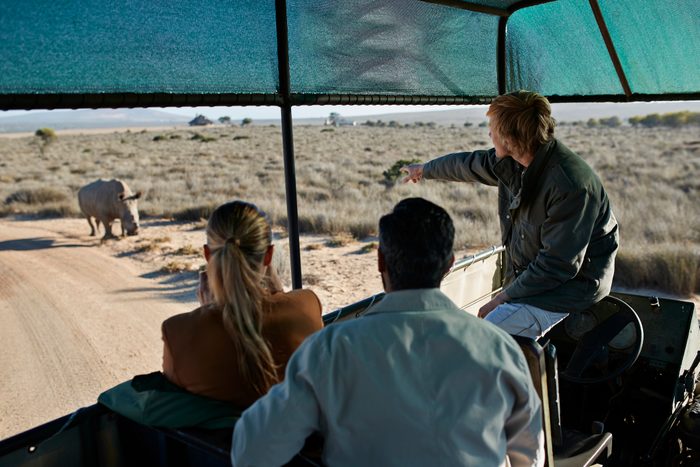
Tipping African tour guides
There are two main types of tour guides in Africa: day guides to popular tourist spots, and safari guides. In both situations, the price for the tour or safari may be negotiated in advance, including the tip. If gratuity isn’t already included, tip your day guide $10 to $20 per person, per day.
If you’re going on a safari—a favorite activity in Serengeti National Park, one of the most popular travel destinations in Africa—ask ahead for how the company would like you to handle tips. Generally speaking, you’ll tip at the end of the safari, in one lump sum. Many safari companies have a tip box in the main area, but you can also hand it to the manager, who will then distribute it to the staff. Or you can hand cash to individual staff, if you like.
So, how much should you tip safari guides? Gratuities are usually larger than for day guides, but they vary based on the type and length of trip as well as the services provided.
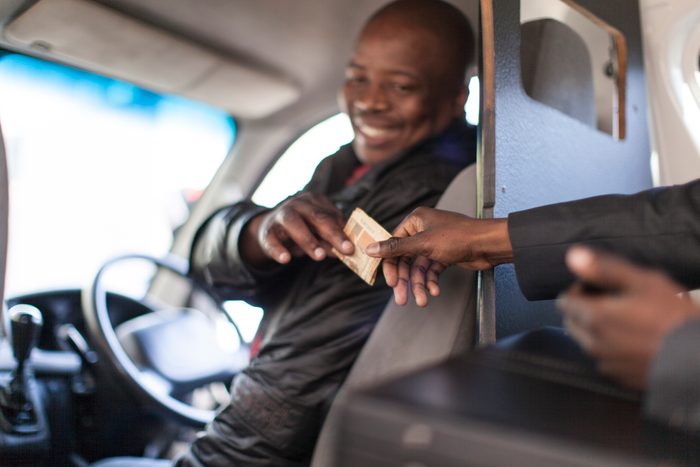
Tipping African taxi drivers
For most places on the continent, rounding up the fare to the next dollar equivalent is enough of a tip, but if you are in a popular tourist spot—like the pyramids in Egypt—tip your driver 10 to 15 percent on top of the fare. Don’t worry about doing complicated math; simply hand the driver the appropriate amount of bills and tell them to keep the change.

Oceania
Oceania is a region that covers most of the islands in the Pacific Ocean, including Australia, New Zealand, Melanesia, Micronesia, and Polynesia. It’s a large, diverse area, but one thing these countries have in common is a very relaxed tipping culture. For the most part, tips aren’t expected, but if you feel like adding a little bit extra to your bill, it is generally under 10 percent.
In Australia and New Zealand, service workers are paid a living wage, so they don’t depend on tips, but they will likely accept one if you offer it. In areas with high tourism, tipping is more common and ranges from 10 to 25 percent, depending on the service. In other areas, like Fiji, tipping is not customary and is discouraged.

Tipping at hotels in Oceania
Bellhops and housekeepers don’t expect tips, but if you receive excellent service and want to show your gratitude, feel free to leave $2 per bag and $2 per day at the end of your stay. If the concierge is particularly helpful, you may tip them as well. Amounts vary depending on the service and are at your discretion.

Tipping at restaurants in Oceania
In these Pacific countries, it’s rare to see people tip in bars or casual restaurants, but if you’re dining somewhere upscale, leave a tip of around 10 percent of the bill. In Australia, expect to tip 15 to 25 percent of the bill when dining in popular or high-traffic areas. If you see a tip jar out on a countertop, it’s considerate to drop your spare change or a dollar in. Read about more etiquette rules we shouldn’t abandon.

Tipping tour guides in Oceania
Like the other service sectors, tour guides generally don’t expect tips, but in Australia and New Zealand, it’s a courtesy to offer a small gratuity of around 5 percent of the bill at the end of your tour. In Fiji, tour guides don’t expect tips and may not accept them.
If you take a special guided adventure, like scuba diving or a backcountry trip, plan to tip your guide at the end of the tour. Twenty dollars or 20 percent of the bill, whichever is more, is customary.
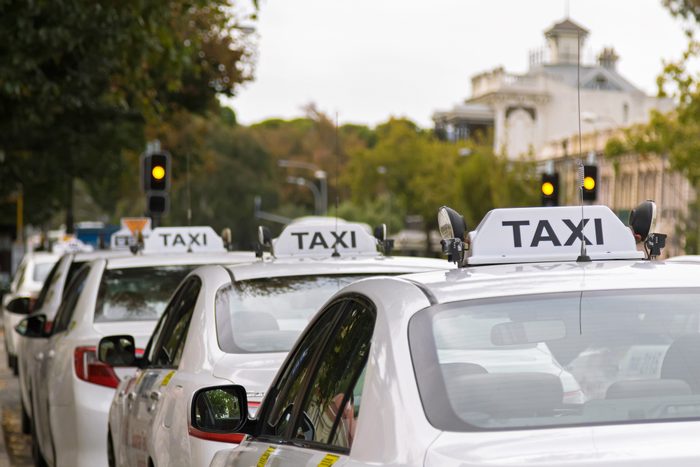
Tipping taxi drivers in Oceania
It’s customary in Australia and New Zealand—for your convenience and the cabbie’s—to round up the fare to the nearest $5. In Fiji, simply pay what the driver charges.
Sources:
- Lori Whatley, PhD, human behavior expert and clinical psychologist
- Bonnie Tsai, manners expert and founder and director of Beyond Etiquette
- Maryanne Parker, international etiquette expert and founder of Manor of Manners International
- Rick Steves: “Tipping in Europe”
- Trip Savvy: “A Guide to Tipping in Asia”
- SA Expeditions: “The ins and outs of tipping in South America”
- Wonderful Wanderings: “Tipping in Africa”
